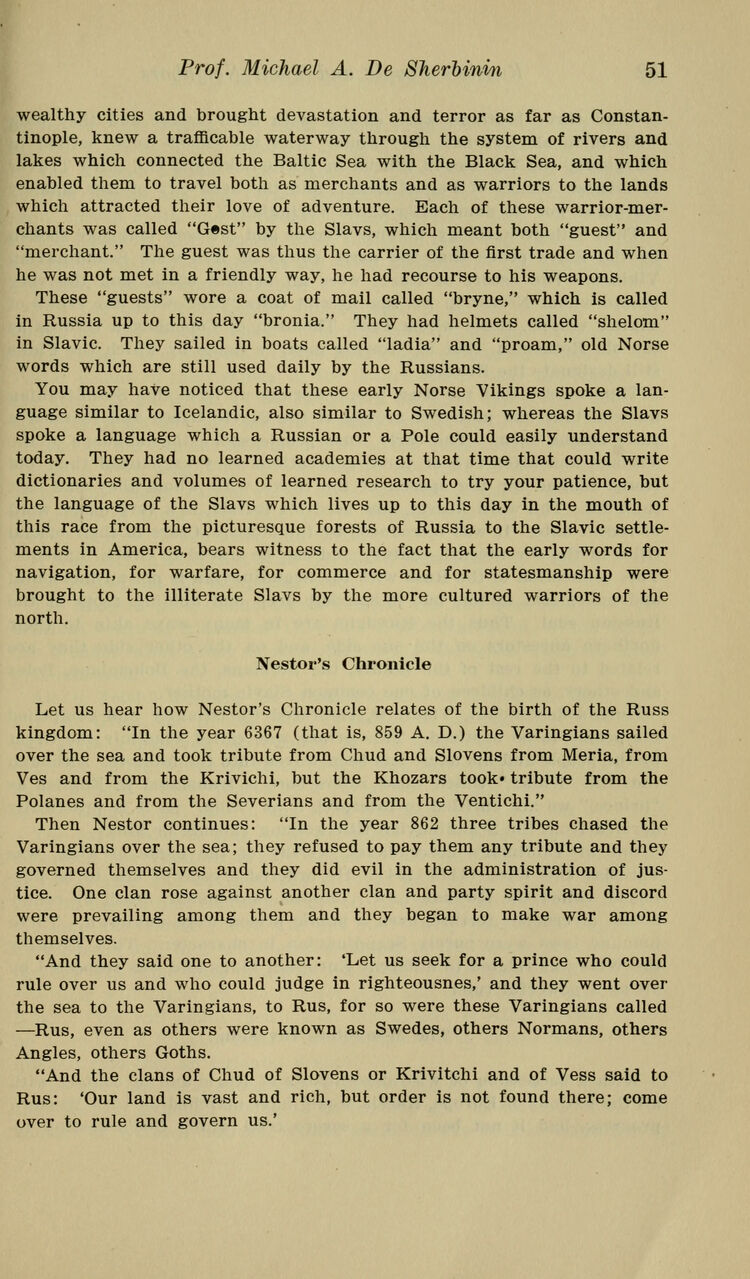
Full resolution (JPEG) - On this page / på denna sida - Russia’s People and Their Neighbors. Prof. Michael A. de Sherbinin - Beginnings of Russian Nation - Nestor’s Chronicle

<< prev. page << föreg. sida << >> nästa sida >> next page >>
Below is the raw OCR text
from the above scanned image.
Do you see an error? Proofread the page now!
Här nedan syns maskintolkade texten från faksimilbilden ovan.
Ser du något fel? Korrekturläs sidan nu!
This page has never been proofread. / Denna sida har aldrig korrekturlästs.
Prof. Michael A. De SJierhinm 51
wealthy cities and brought devastation and terror as far as Constan-
tinople, knew a traflBcable waterway through the system of rivers and
lakes which connected the Baltic Sea with the Black Sea, and which
enabled them to travel both as merchants and as warriors to the lands
which attracted their love of adventure. Each of these warrior-mer-
chants was called "G«st" by the Slavs, which meant both "guest" and
"merchant." The guest was thus the carrier of the first trade and when
he was not met in a friendly way, he had recourse to his weapons.
These "guests" wore a coat of mail called "bryne," which is called
in Russia up to this day "bronia." They had helmets called "shelom"
in Slavic. They sailed in boats called "ladia" and "proam," old Norse
words which are still used daily by the Russians.
You may have noticed that these early Norse Vikings spoke a lan-
guage similar to Icelandic, also similar to Swedish; whereas the Slavs
spoke a language which a Russian or a Pole could easily understand
today. They had no learned academies at that time that could write
dictionaries and volumes of learned research to try your patience, but
the language of the Slavs which lives up to this day in the mouth of
this race from the picturesque forests of Russia to the Slavic settle-
ments in America, bears witness to the fact that the early words for
navigation, for warfare, for commerce and for statesmanship were
brought to the illiterate Slavs by the more cultured warriors of the
north.
Nestor’s Chronicle
Let us hear how Nestor’s Chronicle relates of the birth of the Russ
kingdom: "In the year 6367 (that is, 859 A. D.) the Varingians sailed
over the sea and took tribute from Chud and Slovens from Meria, from
Ves and from the Krivichi, but the Khozars took* tribute from the
Polanes and from the Severians and from the Ventichi."
Then Nestor continues: "In the year 862 three tribes chased the
Varingians over the sea; they refused to pay them any tribute and they
governed themselves and they did evil in the administration of jus-
tice. One clan rose against another clan and party spirit and discord
were prevailing among them and they began to make war among
themselves.
"And they said one to another: ’Let us seek for a prince who could
rule over us and who could judge in righteousnes,’ and they went over
the sea to the Varingians, to Rus, for so were these Varingians called
—Rus, even as others were known as Swedes, others Normans, others
Angles, others Goths.
"And the clans of Chud of Slovens or Krivitchi and of Vess said to
Rus: ’Our land is vast and rich, but order is not found there; come
over to rule and govern us.’
<< prev. page << föreg. sida << >> nästa sida >> next page >>